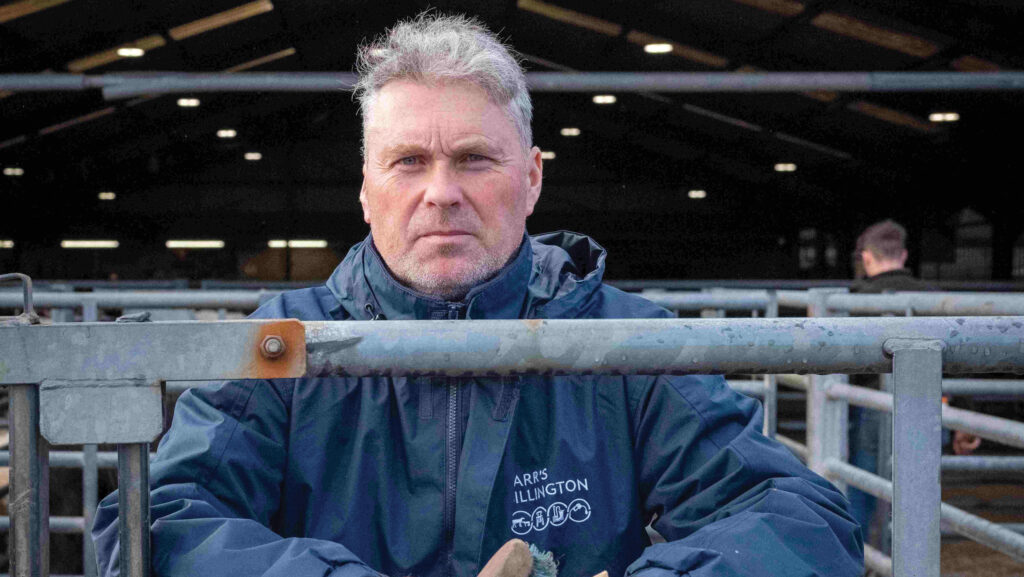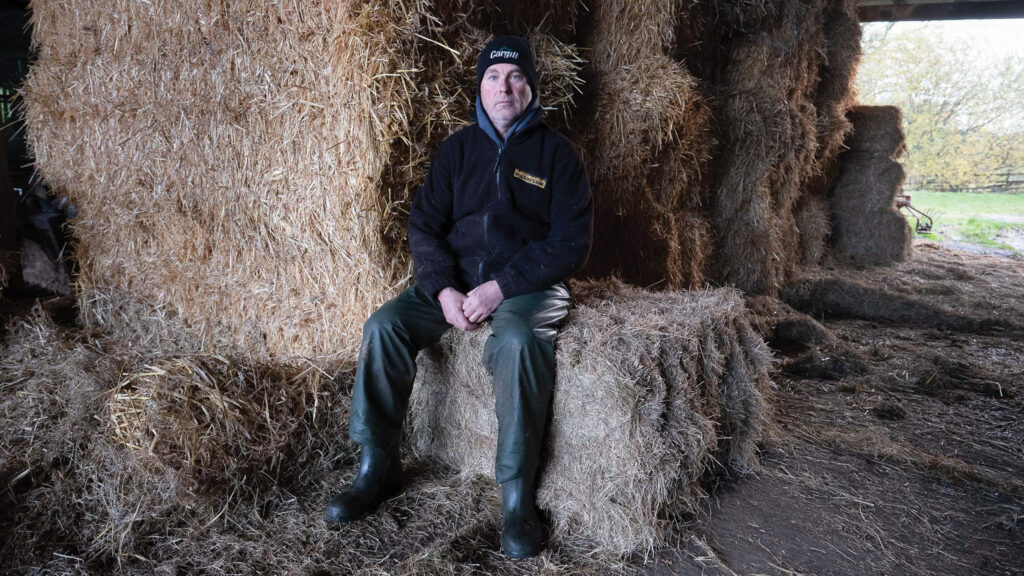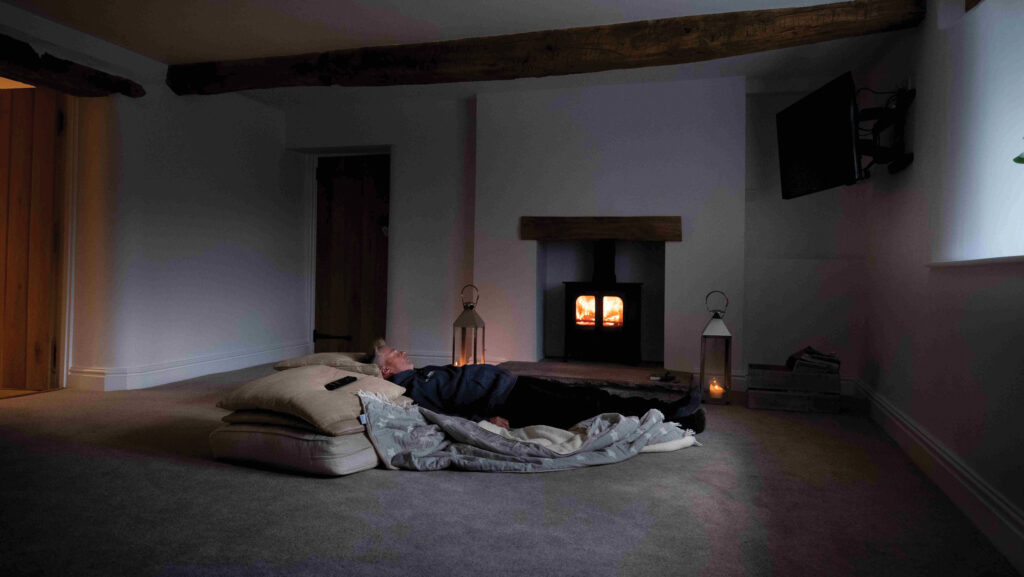Cumbrian farmer shares story of living with ME in photo exhibit
 Andrew Jackson © Jeremy Jeffs
Andrew Jackson © Jeremy Jeffs A fourth-generation farmer from Cumbria, Andrew Jackson, has lived with the debilitating effects of Myalgic Encephalomyelitis/Chronic Fatigue Syndrome (ME/CFS) for more than 13 years.
Despite this, he continues to work the land at Littlebeck Farm, near Penrith, with the support of his family.
His life with this chronic condition was recently captured in a photography exhibition, Lives We Cannot Live, which ran at London’s Oxo Tower from 24 to 28 September.
The exhibition, hosted by The ME Association and created by documentary film-maker and photographer Jeremy Jeffs, featured more than 50 striking images of individuals from across the UK living with ME/CFS.
See also: Neurodiversity in farming may be double rate of general public
Among them was Andrew, whose story was told through a series of intimate photographs documenting both his daily work on the 180-acre beef and sheep farm, and the moments of enforced rest dictated by his condition.
Andrew developed ME/CFS following a life-altering agricultural accident 13 years ago.
Since then, the condition has slowly taken a physical toll, forcing him to drastically alter how he farms.
“As each year ticks by, I’m slowly getting weaker, experiencing the debilitating effects and exhaustion of ME/CFS,” he says.
“Yvette [Andrew’s wife] and I are keen to raise awareness of the condition, as there is a lack of understanding of what it’s like to live with.”

© Jeremy Jeffs
Committed to farming
Despite often feeling physically depleted by the condition, Andrew remains deeply committed to farming, albeit at a different pace.
Everyday tasks must now be broken into smaller steps or avoided entirely. Post-exertional malaise, where symptoms worsen dramatically after physical or mental activity, often forces him to rest for hours or days at a time.
“Things have had to change on the farm. We have had to adapt as a family,” Andrew explains.
“Being a livestock farm and having a lot of pride in our stock, it’s quite tough on me as I often have to take a step back.
“We were drenching the sheep the other day, and I had to stand on the side of the sheep pen.
“I was itching to come in and help, but I’m a lot weaker now in my body and my hands. Standing from the outside looking in isn’t a nice feeling.”
Yvette, who helps manage the farm and supports Andrew, describes how the condition has reshaped their way of life.
She said: “I know it’s quite frustrating for Andrew at times. His mind wants to do the jobs, but his body won’t let him.
“He can overdo it very easily and crashes out. He gets frustrated. You know what farmers are like, they are strong, tough, and resilient individuals, and often push themselves to the limit, and Andrew can’t do that now.”
Isolation
Martine Ainsworth-Wells, trustee and campaigns director at The ME Association, reflects on the additional burden faced by farmers like Andrew living with ME/CFS in rural settings.
“Farming life is quite isolating in itself, and ME/CFS, particularly when it is severe, is really isolating, so it can double the impact,” she said.
“And farming is such a physical job, so I know it’s difficult to find a pace of life with that. The long and hard hours in agriculture are compounded by this condition.”
Support measures
The couple’s son, Kieran, has already stepped in to support the day-to-day running of the farm, and Andrew hopes he’ll take it over one day.
“I have got a boy in his mid-20s who wants to carry on the farm,” Andrew says.
“We have to give him every chance that we can. We might have to cut back on stock a little bit if I can’t help as much. And then when Kieran takes it on, we hope it can grow back up again.”

© Jeremy Jeffs
He adds, “I can feel that I am weaker as the days go by, but if we can get the ME to slow down a bit, I can help him for years and years to come, and the farming legacy goes on.”
Yvette remains pragmatic.
“It’s really hard to judge how the next few years will look for Andrew,” she says.
“It’s very much a case of taking each day as it comes, really, and all chipping in and keeping the farm ticking over. We have such supportive friends, neighbours, and family who are there for us when we need extra help.
“Farming is a way of life, and that’s not something you can knock out of Andrew,” she adds.
“He is very passionate about it, and it’s not something we want to take away from him. When he’s feeling down in the dumps, he can pop outside and have a look at his sheep and his cattle.”
Photo exhibition – sharing the story
For Andrew, the exhibition was a rare opportunity to step into the spotlight, not something he’s typically comfortable with.
“I’m not a very photogenic kind of guy, I usually hide in the back at weddings,” he jokes.
“It was a little bit strange, but Jeremy, the photographer, did a great job with his pictures. He really captured the mood well. Hopefully it does a bit of good in the long run.”
Yvette agreed. “We are quite private people, we aren’t on social media, and we just get on with day-to-day life with Andrew’s health and running the farm.
“Life is tough at times. Every day presents its own challenges. The exhibition provides people with an insight into our family and Andrew’s health. It is quite an emotional thing to bare all.”
She added: “The images are really quite striking and are very emotive. They really do show some of the darkness in people’s lives. It’s great to raise awareness.”
Yvette hopes the exhibition will spark broader awareness, not just about ME/CFS, but about how the condition affects working people, particularly in agriculture.
“We hope that with this exhibition it sparks some change and some additional funding from the government to recognise that ME is a real problem and look for diagnostics and treatment.
“I hope this might also encourage farmers to reach out for help if they are feeling aches and pains, because we often bury our heads in the sand.
“I want to encourage farmers to reach out to a health professional. Farmers need to look after themselves.”

